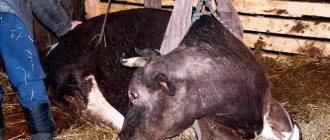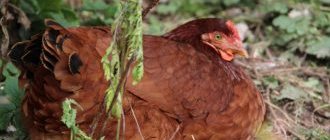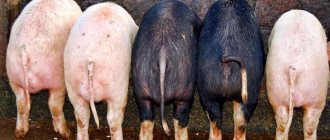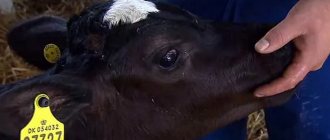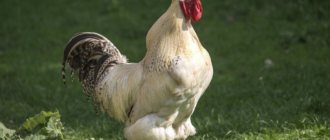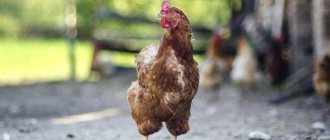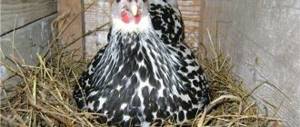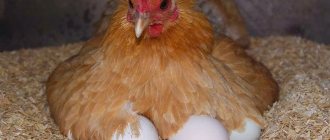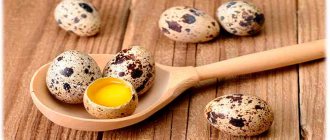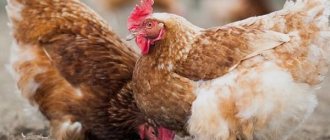What is a rooster for?
When breeding laying hens, it is the females that are important. They are responsible for the production of eggs and are their direct source. But, in this case, a logical question arises: do laying hens need a rooster? You can find many answers to this on the Internet. But only one will be correct.
The fact is that the importance of the male depends on what the eggs are planned to be used for:
- for consumption only;
- for consumption and breeding new offspring.
Do you need a rooster?
In the first case, you can firmly answer that the farm can easily manage without a rooster.
Laying hens will be able to produce eggs without his participation, since he does not take any part in the process of formation of the yolk, white and shell.
But, if we talk about using eggs to hatch chickens, then there is no way without a rooster. It is his participation in the life of the female individual that influences the formation of the embryo, from which the chick subsequently appears. The absence of a rooster in the flock completely reduces to zero the possibility of breeding offspring at home.
Therefore, deciding whether a rooster is needed for chickens is an individual decision. They proceed directly from whether the farm is run for one’s own use or for its constant replenishment.
How a rooster impregnates a hen
Until now, scientists have not come to a consensus on the question of whether the rooster has a reproductive organ. The search for arguments in favor of one or another assumption continues in our time. And how, with this (or without “this”), is one rooster able to satisfy more than a dozen hens?
Strictly speaking, a rooster still has a genital organ; nature has endowed the male with genitals, but they can only be seen in a chicken embryo and only in an embryonic, rudimentary state. But how then does the rooster trample the hen?
Rooster impregnates hen
Chickens have a special hole on their back for conception. The rooster sits on top of the hen and moves her feathers with his feet, looking for this hole. At this time, he holds the female by the back of her head with his beak. Sexual intercourse in birds occurs quickly, within just a few seconds. A rooster can mate many times during the day.
Important! If this happens too often, the male's semen concentration decreases, and this leads to a decrease in the viability of the chicks.
Throughout the year, the potency of the rooster is almost unchanged. Only during the molting period does he stop trampling the chickens.
The rooster's reproductive organ consists of small testes. Thin channels extend from them, which end in the cloaca. Sperm come out through a small nipple.
The chicken's reproductive system consists of a grape-shaped ovary, which is located on the right side, and an oviduct, ending in the middle section of the cloaca. The ovary serves to form and mature future egg yolks.
While the rooster tramples the hen, their cloacae are connected. In the male, the cloaca turns outward and the sperm thus enter the female. After a hen mates with a rooster, seminal fluid can remain active in her genital tract for 20 days. The egg that is already mature at this time is released into the oviduct and fertilization occurs there. The female gamete has a small tubercle through which the sperm penetrates into the egg. During this process, the tail of the sperm is separated, leaving only the head inside the egg.
The influence of a rooster on the taste of eggs
You can find opinions that:
- eggs from chickens in which there is a male in the flock are more tasty;
- Fertilized eggs have beneficial properties.
Neither the first nor the second statement is true. The influence of the male is purely physiological. That is, it is limited solely by the ability to breed new chicks. Otherwise there is no difference.
In terms of size, volume and composition, the eggs in both options will be absolutely identical. Fertilization of a chicken by a rooster does not in any way affect the taste and does not make the product more beneficial for the body when consumed. Therefore, you should not believe everything that they write.
Egg production
The hen begins to lay eggs for the first time around the sixth month of her life. Sometimes this age varies depending on the characteristics of the breed. Most often, a chicken lays one egg per day.
To start laying eggs, the presence of a male is not necessary. The egg cell begins to mature in the chicken body. If she is not fertilized, there will be no offspring, but there will be an egg.
If there is a rooster next to the hen, the egg will mature. A chicken egg is covered with a membrane called a follicle. When it leaves the shell, it enters the oviduct. The egg moves through the reproductive system for about twelve hours. During this period, white and shell are formed near it.
As soon as the chicken lays an egg, then forty minutes later, a new egg begins to move through her oviduct. Can hens lay eggs without a rooster? The answer is obvious - yes.
Disadvantages of keeping chickens with a rooster
The question is relevant because many owners know how difficult it can sometimes be to deal with males on the farm. Having a rooster in a flock has a number of disadvantages:
- Aggressive behavior. By nature, the male is called upon to protect the family. Therefore, all the chickens in the flock are constantly under his “supervision.” Often this behavior is expressed in an attack on the owners, strangers, preventing the females from being fed or the eggs taken.
- Appearance of a chicken. To fertilize the female, the male “tramples” her. This process in itself is not very attractive, and its consequences are even more so. As a result, chickens walk around plucked, with scratches that can become infected, causing their later death.
- The desire to breed. The instinct of a fertilized chicken is triggered - it is necessary to hatch the chick. Accordingly, it becomes more difficult to collect eggs, since the laying hen can hide them in a makeshift nest from the owners. In addition, for those who do not want to raise chickens, this result is generally undesirable. In most laying hens, laying hens are bred in the spring and autumn to produce eggs and meat. The appearance of chickens comes as a complete surprise.
Roosters often “trample” their ladies and crow in the morning
Just as some people like the crow of a rooster at dawn, some people find it unpleasant. The presence of a male in the flock necessarily entails his singing in the morning. So, when starting him in a flock, you should be prepared for an early rise.
Can a hen lay eggs without contact with a rooster?
Can hens lay eggs without interaction with a male? In practice, birds fly almost the same way, whether with or without a rooster. It turns out two types of eggs - fertilized and not. The latter are inferior in biological and nutritional value, but do not differ in taste. You can eat both of them.
A chicken egg is like a woman's egg. Laying hens will lay them regularly. However, it will not be possible to get offspring. Fertilized eggs are required to hatch chicks. Conclusion - to breed chickens you need a male.
Birds often refuse to sit in special boxes to lay eggs. Leaving offspring is a task programmed by nature. If the chicks do not appear for a long time, a malfunction occurs and the hens stop laying eggs.
In herds where there is no male, one of the hens begins to play his role. This is manifested in attempts to imitate his behavior - aggressiveness, active protection of laying hens from predators and the owner, similar “trampling” of females. It is recommended to immediately isolate such a hen to avoid fights and dangerous clashes between birds.
Does a chicken need a rooster? The breeder decides independently, based on the situation, breeding goals, required volume of eggs and other circumstances. Another important point is the method of fertilization.
Pros of keeping chickens with a rooster
But, despite the rather large shortcomings, experts also highlight a number of positive aspects:
- Fertilization. The first point will be to answer the question of whether a rooster affects the egg production of chickens. Its sole role in fertilization makes it possible to place eggs in an incubator and wait for the chicks to hatch. Without a rooster in the flock, you shouldn’t even try to hatch an egg, since absolutely nothing will come of it.
- Organized pack. Owners who have a rooster for laying hens note that females become more obedient. They do not wander around the area and come running to the first call of their male. The calmness of females depends on the rooster.
- Protection. The rooster is the master of the flock. He can help his family when attacked by other animals, protecting the livestock from the enemy. Also, all the best that the male finds is given to the females.
That is, there is still some delicacy from him. Therefore, it is not worth saying that males are absolutely not needed for chickens. Although the rooster spoils the appearance and creates an aggressive attitude, his care, protection and organization of the flock also play a role.
How many roosters do you need?
An equally important issue is the number of males per flock. If the owner decides to have a rooster. Then you need to first calculate the number of males.
What is it for? Anyone who has seen a flock with two or more males knows that they rarely make peace with each other. Roosters will constantly fight among themselves for primacy in their flock, for females, etc. In addition, this disrupts organization and increases the overall aggressiveness of the birds.
2 roosters for 13 laying hens is a LOT
Therefore, you need to correctly calculate exactly how many males are needed. Everything here directly depends on the number of females. As a general rule, 10 to 13 laying hens need one rooster. Accordingly, the number of males is derived from the presence of females.
What to do if there are more than 20 chickens in the flock? In this case, it is recommended to divide them into two families, each of which will have its own male. In addition, it is better to create different chicken coops and walking areas for them. This minimizes the likelihood of males fighting.
Accordingly, we can say that the decision on the need for a rooster on the farm should be made in accordance with the goals of raising laying hens.
If you don’t plan to breed them, then you shouldn’t get a male. This is especially true when chickens live in cages. The rooster will only take up extra space and will not affect the number of eggs.
Benefits of having a rooster
Why do you need a rooster? Let's talk about the advantages of its content.
The bird can lay eggs without a male present. But fertile eggs will appear only if he is present. Therefore, if it is necessary to update the livestock, it is impossible to do without a rooster.
Will the rooster be reliable? If so, then you will not be able to worry about the brood during the walk. The male will never offend his family and will drive away strangers. In addition, he makes sure that everyone returns to the coop safe and sound.
The rooster gives protection to the chickens. It reliably protects the bird house from uninvited guests. If any predatory animal decides to visit the chicken coop, the male will take all measures to drive it away.
If the predator resists, this often ends in a quarrel or fight. Unfortunately, sometimes the fight can be unequal and the rooster dies. But the noise from such a brawl can attract the owner of the farm, who will save the rest of the livestock.
Another aspect of the issue is aesthetics. The rooster is kept not only for hatching chickens and caring for hens. Everyone knows how beautifully birds crow in the morning, awakening all the living creatures in the yard. In addition, a guardian appears in the chicken coop for all hens.
It is very interesting to watch roosters from the outside. The male calls his hens to eat food and shows them the location of their nests. He clucks with them for company. In addition, in appearance the rooster is very beautiful, bright, and graceful. Especially if you choose a purebred male, he can become a true decoration of your farm.
